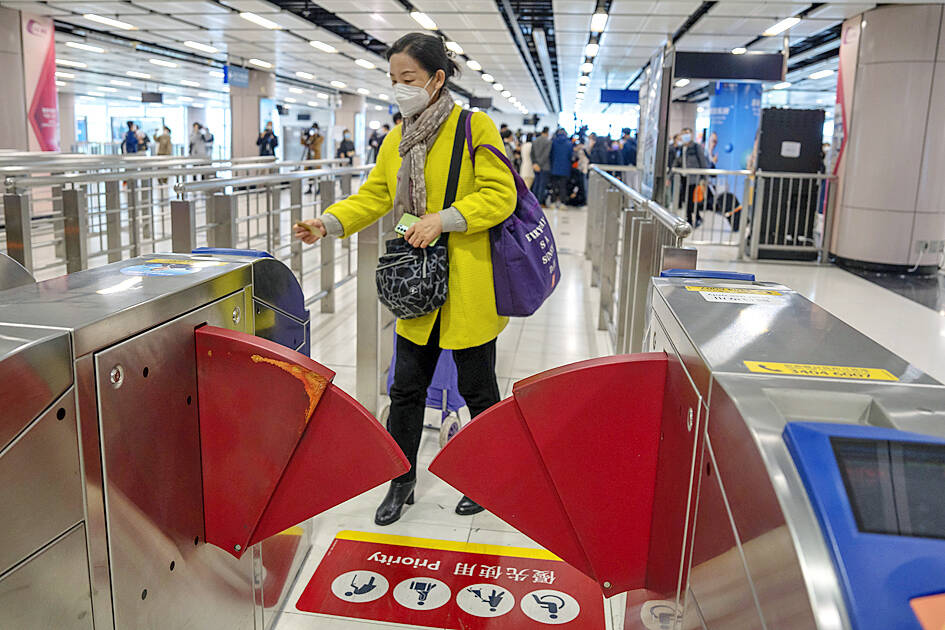After a near-certain contraction last year for the third time since 2019, Hong Kong’s economy is coming back stronger this year and might even grow faster than rival financial hub Singapore for the first time in more than a decade.
Economists are upgrading their forecasts for Hong Kong this year as the city accelerates its reopening with China and the rest of the world.
The median estimate in a Bloomberg survey of 12 economists last week was 3.3 percent growth for this year, higher than the 2.7 percent forecast in a survey of 25 economists in November last year.

Photo: AP
Analysts are becoming more optimistic as Hong Kong sheds its remaining COVID-19 curbs and rolls out a plan to allow people to more freely cross the border to China again.
China on Sunday ended quarantine for arrivals, making cross-border travel a reality again for many people.
An influx of arrivals would be good news for the territory, and could revive businesses that have been hurt by the closure, from hotel and catering companies to investment and wealth management firms.
“We see Hong Kong turning the corner, but the real effects are likely to be seen only in the second half of 2023,” Moody’s Analytics economist Heron Lim (林師順) said.
He expected Hong Kong’s GDP to expand 3.8 percent this year, compared with a November estimate of 3.2 percent.
Lim said quarterly growth could reach 7.7 percent in the October-to-December period.
Hong Kong officials have said they think GDP shrank 3.2 percent last year.
Growth in trade-reliant Singapore is projected to level off this year as the US and Europe head for likely recessions, with the most recent estimate in a Bloomberg survey showing the city-state would expand 2 percent after expanding 3.8 percent last year.
If Hong Kong grows at a faster pace, it would surpass Singapore for the first time since 2008.
Economists who participated in the most recent Hong Kong survey expect the city to turn to fiscal support and other measures to shore up growth this year.
Three respondents said they thought officials would issue more consumption vouchers worth HKD$5,000 (US$640) per person to spur spending, while seven people said either personal or corporate tax cuts could be on the table.
Respondents were allowed to select more than one option.
Even as Hong Kong reopens — to China and the rest of the world — its problems could be hard to fix. The years of isolation cost Hong Kong’s economy an estimated US$27 billion in potential growth, analysis by Natixis SA said.
The city’s property market — the world’s least affordable — is also under strain as interest rates rise and housing demand slides, while global headwinds including weak demand and an impending worldwide recession are adding to the territory’s woes.
“China’s reopening is helpful, but it will not solve all problems Hong Kong has right now,” Natixis senior economist Gary Ng (吳卓殷) said.
He projected growth of 3 percent for this year, slightly below the median estimate.
“As higher interest rates and global slowdown kick in this year, the city’s economic prospect is only cautiously optimistic with short-term pressure,” he said.

Taiwan will prioritize the development of silicon photonics by taking advantage of its strength in the semiconductor industry to build another shield to protect the local economy, National Development Council (NDC) Minister Paul Liu (劉鏡清) said yesterday. Speaking at a meeting of the legislature’s Economics Committee, Liu said Taiwan already has the artificial intelligence (AI) industry as a shield, after the semiconductor industry, to safeguard the country, and is looking at new unique fields to build more economic shields. While Taiwan will further strengthen its existing shields, over the longer term, the country is determined to focus on such potential segments as

UNCERTAINTY: Innolux activated a stringent supply chain management mechanism, as it did during the COVID-19 pandemic, to ensure optimal inventory levels for customers Flat-panel display makers AUO Corp (友達) and Innolux Corp (群創) yesterday said that about 12 to 20 percent of their display business is at risk of potential US tariffs and that they would relocate production or shipment destinations to mitigate the levies’ effects. US tariffs would have a direct impact of US$200 million on AUO’s revenue, company chairman Paul Peng (彭雙浪) told reporters on the sidelines of the Touch Taiwan trade show in Taipei yesterday. That would make up about 12 percent of the company’s overall revenue. To cope with the tariff uncertainty, AUO plans to allocate its production to manufacturing facilities in

COLLABORATION: Given Taiwan’s key position in global supply chains, the US firm is discussing strategies with local partners and clients to deal with global uncertainties Advanced Micro Devices Inc (AMD) yesterday said it is meeting with local ecosystem partners, including Taiwan Semiconductor Manufacturing Co (TSMC, 台積電), to discuss strategies, including long-term manufacturing, to navigate uncertainties such as US tariffs, as Taiwan occupies an important position in global supply chains. AMD chief executive officer Lisa Su (蘇姿丰) told reporters that Taiwan is an important part of the chip designer’s ecosystem and she is discussing with partners and customers in Taiwan to forge strong collaborations on different areas during this critical period. AMD has just become the first artificial-intelligence (AI) server chip customer of TSMC to utilize its advanced

Chizuko Kimura has become the first female sushi chef in the world to win a Michelin star, fulfilling a promise she made to her dying husband to continue his legacy. The 54-year-old Japanese chef regained the Michelin star her late husband, Shunei Kimura, won three years ago for their Sushi Shunei restaurant in Paris. For Shunei Kimura, the star was a dream come true. However, the joy was short-lived. He died from cancer just three months later in June 2022. He was 65. The following year, the restaurant in the heart of Montmartre lost its star rating. Chizuko Kimura insisted that the new star is still down